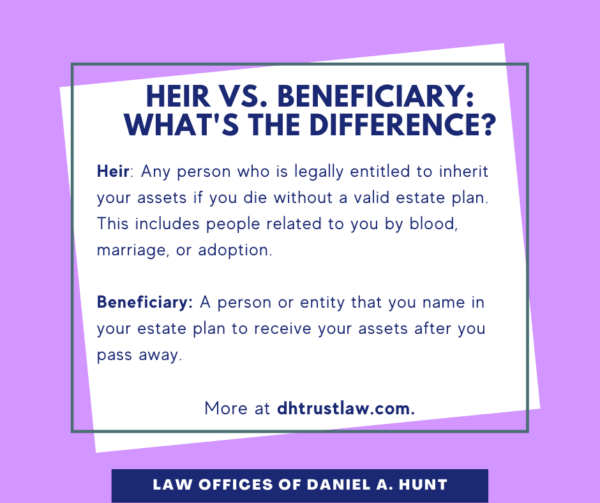What’s the Difference Between an Heir and a Beneficiary?

The terms “heir” and “beneficiary” are sometimes used interchangeably in estate planning discussions. While both terms refer to people who may inherit something from your estate after your death, there are critical legal differences between the two terms. What’s the difference between an heir and a beneficiary? Here’s an overview.
What is an heir?
An heir (also known as an “heir at law”) is any person who is legally entitled to inherit your assets if you die “intestate” – meaning without a valid estate plan such as a trust or will. Heirs are people who are related to you by either blood or marriage, such as a spouse, children, or other family members.
If you die without an estate plan, your estate will be distributed according to the California laws of intestate succession. These laws are complex but in general, your estate assets will be distributed to heirs in the following order of priority:
- Your surviving spouse (if you have one)
- Your children (including biological children, adopted children, and posthumous children)
- Your parents
- Your siblings
- Your grandparents
- Your extended family, or “next of kin” (like nieces, nephews, and cousins)
Intestate succession laws only include people legally or biologically related to you as potential heirs. Others, such as foster children or stepchildren, are generally excluded. If you want to leave an inheritance for these individuals, you must create an estate plan and name them as beneficiaries.
If a person dies without a will and no one can locate any heirs, the state inherits the deceased person’s property — but this rarely happens.
What is a beneficiary?
A beneficiary is a person or entity that you name in your will or trust to receive your assets after you pass away. Unlike an heir, a beneficiary may not necessarily be related to you. They can be anyone you choose, including friends or charitable organizations like a school, church, or nonprofit.
Sometimes beneficiaries are the same people who would have been heirs, like in situations where people leave their entire estate equally to their children. But this is not always true. When you create an estate plan, you have the option to disinherit those who would have been natural heirs and leave your assets to other desired beneficiaries.
You also have the option to include as a beneficiary someone who would not have naturally been considered an heir, such as a foster child or a longtime friend. Whoever you name as a beneficiary in your estate plan will have a legal claim to your estate assets that outranks your heirs.
Here’s an example. Let’s say you have a very close relationship with your stepchild who you helped raise from a young age, but you are estranged from one of your biological children. If you fail to create an estate plan before your death, your stepchild would inherit nothing from your estate while your biological child would stand to inherit your assets. But if you create a legal document such as a will or trust, you can name your stepchild as a beneficiary and disinherit your biological child.
Rights of a Beneficiary Versus Heir in an Estate Administration
The rights of a beneficiary are very different from the rights of an heir during an estate administration if the decedent created an estate plan.
After the decedent’s passing, a beneficiary of a will or trust is entitled to:
- Notice of the trust or estate administration
- A copy of the trust or will
- Regular updates from the trustee or executor
- An annual accounting of the administration
An heir at law may be entitled to these things if they are also listed as a beneficiary. However, if the heir has been disinherited in the decedent’s estate plan, they are not legally entitled to any of the above information. If the disinherited heir wishes to obtain this information, they should seek the counsel of an experienced trust and estate litigation attorney.
Rights of Heirs in an Estate Administration
If the decedent died intestate, then the estate will need to pass through the California Probate Court before any heirs can receive an inheritance or take possession of the decedent’s assets. The exception would be any assets that were payable on death or had a listed beneficiary, such as a life insurance policy or retirement account.
The estate’s personal representative will need to seek to be appointed and then administer the estate under the supervision of the court, ideally with the guidance of a probate attorney. During the lengthy probate process, the estate heirs are entitled to:
- Notice of the estate administration
- Regular updates from the estate personal representative
- An annual accounting of the administration
At the end of the probate proceeding, the court will decide on the heirs’ inheritance based on the laws of intestate succession.
If you have any questions about this topic, feel free to contact our law firm.
Law Offices of Daniel A. Hunt
The Law Offices of Daniel A. Hunt is a California law firm specializing in Estate Planning; Trust Administration & Litigation; Probate; and Conservatorships. We've helped over 10,000 clients find peace of mind. We serve clients throughout the greater Sacramento region and the state of California.




